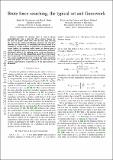| dc.contributor.author | Christiansen, Mark M. | |
| dc.contributor.author | Duffy, Ken R. | |
| dc.contributor.author | Medard, Muriel | |
| dc.contributor.author | Calmon, Flavio du Pin | |
| dc.date.accessioned | 2014-09-29T15:32:41Z | |
| dc.date.available | 2014-09-29T15:32:41Z | |
| dc.date.issued | 2013-07 | |
| dc.identifier.isbn | 978-1-4799-0446-4 | |
| dc.identifier.issn | 2157-8095 | |
| dc.identifier.uri | http://hdl.handle.net/1721.1/90432 | |
| dc.description.abstract | Consider the situation where a word is chosen probabilistically from a finite list. If an attacker knows the list and can inquire about each word in turn, then selecting the word via the uniform distribution maximizes the attacker's difficulty, its Guesswork, in identifying the chosen word. It is tempting to use this property in cryptanalysis of computationally secure ciphers by assuming coded words are drawn from a source's typical set and so, for all intents and purposes, uniformly distributed within it. By applying recent results on Guesswork, for i.i.d. sources it is this equipartition ansatz that we investigate here. In particular, we demonstrate that the expected Guesswork for a source conditioned to create words in the typical set grows, with word length, at a lower exponential rate than that of the uniform approximation, suggesting use of the approximation is ill-advised. | en_US |
| dc.description.sponsorship | United States. Dept. of Defense (Air Force Contract FA8721-05-C-0002) | en_US |
| dc.language.iso | en_US | |
| dc.publisher | Institute of Electrical and Electronics Engineers (IEEE) | en_US |
| dc.relation.isversionof | http://dx.doi.org/10.1109/ISIT.2013.6620428 | en_US |
| dc.rights | Creative Commons Attribution-Noncommercial-Share Alike | en_US |
| dc.rights.uri | http://creativecommons.org/licenses/by-nc-sa/4.0/ | en_US |
| dc.source | arXiv | en_US |
| dc.title | Brute force searching, the typical set and Guesswork | en_US |
| dc.type | Article | en_US |
| dc.identifier.citation | Christiansen, Mark M., Ken R. Duffy, Flavio du Pin Calmon, and Muriel Medard. “Brute Force Searching, the Typical Set and Guesswork.” 2013 IEEE International Symposium on Information Theory (July 2013). | en_US |
| dc.contributor.department | Massachusetts Institute of Technology. Department of Electrical Engineering and Computer Science | en_US |
| dc.contributor.department | Massachusetts Institute of Technology. Research Laboratory of Electronics | en_US |
| dc.contributor.mitauthor | Calmon, Flavio du Pin | en_US |
| dc.contributor.mitauthor | Medard, Muriel | en_US |
| dc.relation.journal | Proceedings of the 2013 IEEE International Symposium on Information Theory | en_US |
| dc.eprint.version | Original manuscript | en_US |
| dc.type.uri | http://purl.org/eprint/type/ConferencePaper | en_US |
| eprint.status | http://purl.org/eprint/status/NonPeerReviewed | en_US |
| dspace.orderedauthors | Christiansen, Mark M.; Duffy, Ken R.; du Pin Calmon, Flavio; Medard, Muriel | en_US |
| dc.identifier.orcid | https://orcid.org/0000-0003-2912-7972 | |
| dc.identifier.orcid | https://orcid.org/0000-0003-4059-407X | |
| mit.license | OPEN_ACCESS_POLICY | en_US |
| mit.metadata.status | Complete | |
